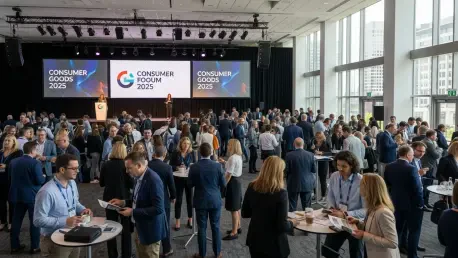Imagine a retail landscape where consumer demands shift overnight, technology reshapes every transaction, and sustainability is no longer a choice but a mandate—a reality that China’s consumer goods industry faces today. This pressing context was the driving force behind CGF China Day, held on September 11th and 12th in Beijing. Hosted by The Consumer Goods Forum (CGF), this landmark event drew over 600 industry leaders—retailers, manufacturers, policymakers, and tech innovators—to unite under the theme “Shaping the Future of Consumer Goods and Retail Together.” The gathering served as a crucible for ideas, addressing the urgent challenges and vast opportunities within one of the world’s most dynamic markets. It set out to chart a path for collaboration and innovation, promising to redefine how the sector operates in an era of rapid transformation.
Setting the Stage for Retail Innovation
The significance of this event lies in its timing and scope. China’s retail sector is at a crossroads, grappling with evolving consumer behaviors, digital disruptions, and mounting pressure to adopt sustainable practices. Over two days, participants engaged in a series of keynote speeches, panel discussions, and hands-on workshops, all designed to foster dialogue and actionable strategies. The event not only spotlighted local market trends but also aligned them with global standards, creating a unique platform for cross-border learning. From the outset, the tone was clear: the industry must act collectively to navigate these complexities and build a future that prioritizes both business growth and societal good.
The diversity of attendees added depth to the conversations. Leaders from major corporations like Nestlé China and Alibaba mingled with representatives from local firms and regulatory bodies, ensuring a broad spectrum of perspectives. This mix was critical in addressing the multifaceted challenges facing the sector, from supply chain inefficiencies to environmental impact. By bringing such varied stakeholders together, the event underscored the importance of inclusive problem-solving in shaping the retail landscape.
Key Highlights from the Event
Visionary Keynotes on Industry Transformation
The event kicked off with powerful keynote addresses that framed the pressing need for change. Wai-Chan Chan, Managing Director of CGF, alongside co-chairs Mr. Fei Gao of Mengniu Group and Mr. Shaohua Pu of Bailian Group, delivered compelling insights into the state of the market. They highlighted consumer-centric innovation and sustainability as non-negotiable priorities, urging stakeholders to align with global frameworks like the UN Plastics Treaty while tailoring solutions to local contexts. Their speeches set a forward-thinking tone, emphasizing that unified action is the only way to address the industry’s most daunting hurdles.
Beyond rhetoric, these talks offered concrete takeaways. Announcements of new research and initiatives underscored the role of data in driving strategic decisions, with a focus on balancing profitability with ethical practices. The vision laid out was one of resilience, where adapting to consumer needs and environmental demands would define success in the coming years, particularly through shared goals and measurable outcomes.
Dynamic Panels on Consumer Trends
Panel discussions provided a deep dive into the evolving preferences of Chinese consumers, with sessions like “Future Chinese Consumers and Consumer Market” leading the charge. Experts such as Mr. Wenzhong Zhang of Wumart Group and Mr. Michael Chen of McKinsey unpacked trends like the influence of younger demographics and a shift toward rational spending. Health and sustainability emerged as dominant themes, with speakers stressing the importance of transparency to build trust among discerning buyers.
These conversations revealed a critical consensus: agility is key to staying relevant. The panels explored how digital platforms and green initiatives are reshaping purchasing decisions, pushing companies to rethink traditional approaches. Debates around consumer trust highlighted the need for clear communication, especially in promoting eco-friendly products, as a way to differentiate in a crowded market.
Practical Workshops for Real-World Solutions
Interactive workshops offered a hands-on approach to problem-solving, focusing on actionable strategies for industry challenges. Topics ranged from developing healthier product lines to optimizing supply chains, with participants actively engaging in case studies and group exercises. For instance, sessions on portion control for health-focused offerings provided practical tools for implementation, drawing from real-world examples across the sector.
These activities also emphasized the power of collaboration. Attendees explored data-sharing models to enhance sustainability efforts, brainstorming scalable solutions that could be adapted to various business sizes. Feedback from participants shaped the discussions, ensuring that the outcomes were not just theoretical but grounded in the realities of day-to-day operations, fostering a sense of shared learning.
Cutting-Edge Technology on Display
Technology took center stage with exhibitions that showcased the future of retail. Companies like Alibaba and Nestlé China presented innovations such as AI-driven shopping assistants and automated supply chain platforms, demonstrating their potential to cut costs and improve traceability. These tools aligned with global digital trade regulations, offering a glimpse into how tech can provide a competitive edge.
The excitement around these showcases was palpable. Attendees marveled at systems designed to streamline operations, from reducing stockouts to enhancing consumer engagement through personalized experiences. The message was clear: embracing digital transformation is essential for staying ahead, as it enables efficiency and meets the growing demand for transparency in retail processes.
Reflecting on a Milestone for Retail Progress
CGF China Day in Beijing marked a turning point for the consumer goods and retail industry, leaving a lasting impact through its focus on collaboration and innovation. It crystallized a shared commitment to building a sustainable future, with key insights spanning consumer empowerment, technological advancements, and environmental responsibility. Looking ahead, the momentum from this event calls for sustained action—stakeholders must prioritize partnerships to develop healthier products, invest in digital tools for operational efficiency, and align with green policies to meet regulatory and consumer expectations. As the industry anticipates further engagement at the CGF Global Summit in Vienna next year, the challenge now is to translate these discussions into tangible initiatives, ensuring that the vision of “Better Lives Through Better Business” becomes a lasting reality.









